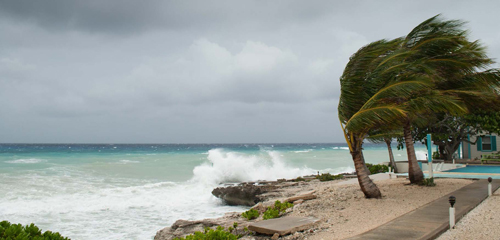At the intersection of climate heating and health
The link between extreme weather events and regional health security is most conspicuous in the Caribbean – a region that serves as a barometer for the world as temperatures rise. C. James Hospedales, former executive director, Caribbean Public Health Agency, says shared vulnerability demands coordinated action on climate change
The Caribbean countries have made great progress in health in the past 30 years, but this progress is threatened by climate change and its unprecedented sequelae. Hotter, drier weather overall, monster storms and inundations of rain are increasingly the norm. Challenges faced by Caribbean people and the five million residents and 50 million visitors annually from G7 members and other countries include environmental degradation, infrastructure resilience and recovery, food and water insecurity, mental ill health, vector-borne diseases and care of persons on medications with chronic illnesses.
The health of the Caribbean people and islands is a barometer for the world, given the vulnerability of the region to extreme weather events. With high interconnectivity and shared vulnerability to natural and human-created threats, national/territorial health security is only possible if there is regional health security. And the security of this region of small island developing states is only possible when the G7 and the rest of the world take serious action on climate change.
The Caribbean Public Health Agency is working with its 24 English-, French- and Dutch-speaking member countries and regional organisations to address these harms in ways that benefit both human health and the climate. Information for action is a major theme. The quarterly Climate and Health Bulletin with the Caribbean Institute of Meteorology and Hydrology and the World Health Organization/Pan American Health Organization provides ‘joined-up’ advice, building understanding between sectors. An expert panel guided the recently published State of Public Health Report on Climate Change and Health in the Caribbean, which provides guidance to policy and decision makers.
CARPHA supports CARICOM Moves, an initiative to address non-communicable diseases by promoting alternative transport including biking, walking and rapid mass transit. The 6-Point Policy Package on healthy food environments encourages consumption of locally and regionally produced fruits and vegetables, which is good for population health, the planet, energy and food security, and for tourism. Major projects include preventing Zika and other mosquito-borne diseases (funded by the European Union), the Caribbean Aqua Terrestrial Solutions programme for environmental monitoring and management (supported by Germany), and the Integrated Water and Ecosystem Management programme with the United Nations Environment Programme.
Setting an example
G7 leaders at their Biarritz Summit can best help by becoming an example in climate control, and supporting SIDS financially and physically as a litmus test of international development. No one knows what happens when a planet is stressed like the Earth’s is now and unprecedented weather events increase, and disasters become more concatenated as planetary and socio-economic systems interact. Biblically inclined leaders should remember the Devil tempting Jesus to throw himself off the temple because God’s angels would save him. Jesus’s reply was instructive: “Thou shalt not tempt the Lord thy God!” Today, humankind is tempting the gods of nature, ignoring contemporary prophets such as the Intergovernmental Panel on Climate Change, much as the people of Israel were deaf to the prophets of old.
G7 leaders can specifically help by:
- Providing human and financial resources to develop a sustainable regional climate and health surveillance system that includes the tourism sector, and that targets climate-sensitive conditions and responds in a timely manner.
- Supporting the development of the health chapters of national resilience plans to climate change, including the use of digital health technologies to enable citizen participation.
- Supporting PAHO’s ‘smart’ hospitals programme, so all health facilities are made hurricane resistant with auxiliary power, communications and water, and cooling systems are replaced with ones that comply with the Kigali Amendment to the Montreal Protocol, because health services now account for 4% of global emissions.
- Building human-resource capacity by training physicians, environmental health officers and other front-line providers in reporting, preventing and controlling climate-sensitive health conditions; improving mental health skills; encouraging the retention/return of healthcare workers; conducting joint training of health and other ministries (such as public works and transport) in climate resilience planning; mobilising the Caribbean diaspora; and enhancing public and policymaker communication.
- Supporting a Caribbean-wide ‘research to action’ programme to counter the effects of climate on health, especially among the most vulnerable, such as the cumulative effects of health disparities, disasters and chronic disease conditions and helping with novel vaccine trials against climate-sensitive, mosquito-borne diseases such as dengue.
- Strengthening Caribbean disaster preparedness, community resilience, and response and recovery systems to include explicit guidelines on how to manage environmental determinants of health.
- Supporting regional projects to help address sanitation and untreated sewage going into the sea, including public engagement and the use of decentralised container-based solutions; investing in alternative transport with urban greening; promoting local agriculture so locals and visitors get healthier food on the table and energy-intensive transport methods are reduced; and improving electricity and telecoms infrastructure.












